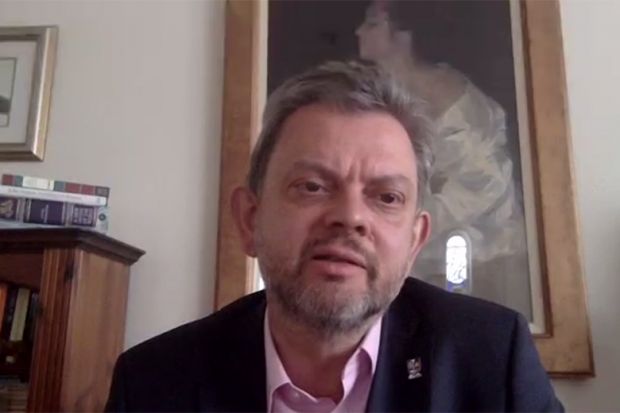Universities will remain “intrinsically global in outlook and in design” despite the Covid-19 pandemic, sector leaders have told the Times Higher Education World Academic Summit.
Anton Muscatelli, principal of the University of Glasgow, said that there was “huge demand still for international education” while the pandemic has shown “the importance of international collaboration in research”.
Speaking during a panel discussion on whether universities will be forced to reduce their global ambitions at the virtual THE event, Professor Muscatelli said that “universities will remain intrinsically global in outlook and in design”.
“I don’t think this crisis will in any way change our outlook,” he said. “My university has been around for over five centuries, through times of strife and war. Immediately after that, even though there might have been a disruption to student mobility and linkages, these linkages immediately sprang back.”
Regarding student mobility, he said that during the Covid-19 crisis there had been “increasing demand for students to come and study in the UK”, a trend he said had been corroborated by colleagues in Canada, Australia and elsewhere.
On research collaboration, he added that close to 70 per cent of Glasgow’s research publications were co-authored by an international partner, up from less than half 10 years ago.
“I don’t think those trends will be reversed,” he said.
Professor Muscatelli acknowledged that travel disruptions during the pandemic were having a short-term impact on mobility but he said that he was “still optimistic that [the crisis] will not impact in the longer run on international demand”.
“During recessions we know that in many respects the relative value of higher education increases...So I think paradoxically one of the impacts of this disruption is actually it will emphasise the importance of international education to the individual,” he said.
While Professor Muscatelli warned that universities “can’t escape geopolitical trends” and “protectionism is a real threat to higher education”, he said that he saw the reduction in the number of international students going to the US in response to the US administration’s “attitudes towards student mobility” as “a little bit of an outlier”.
“I do think that one of the things that the pandemic will show and highlight is the importance of that common place to study and research in order to tackle the major challenges that humanity faces,” he said.
“Let’s not forget that immediately after the pandemic is addressed – if hopefully we can address it with vaccines and treatments over the next year or two – globally we are facing some really impending, much more serious challenges [like] climate change. These will not be solved by individual countries, no matter how powerful they are, and I can see that imperative ultimately driving more collaboration.”
Dawn Freshwater, vice-chancellor of the University of Auckland, also drew attention to the resilience of universities, saying that the higher education sector had “survived, adapted and grown” through tough times in the past and that Covid-19 had “heightened our awareness of our ability to ride through those waves of challenge”.
“In response to the question: will we be forced to reduce our global ambition? I don’t think we will,” she said.
“It doesn’t really change our global outlook, in terms of the life of the mind but also what we’re doing in terms of crossing borders through knowledge exchange…Rather I think it will help us to do what we do well, which is to innovate and imagine our way through it differently.”
Henrik Wegener, rector of the University of Copenhagen, said that he was “not so concerned about the corona crisis per se” but more worried about the deep economic recession triggered by the pandemic.
“How governments choose to deal with that situation is where the real danger lies,” he said. “I hope that governments will choose to invest in education and research as a way out of financial and economic crisis but governments may choose otherwise. There we have an important role to play in convincing them that investing in the future is investing in universities.”
Register to continue
Why register?
- Registration is free and only takes a moment
- Once registered, you can read 3 articles a month
- Sign up for our newsletter
Subscribe
Or subscribe for unlimited access to:
- Unlimited access to news, views, insights & reviews
- Digital editions
- Digital access to THE’s university and college rankings analysis
Already registered or a current subscriber?










